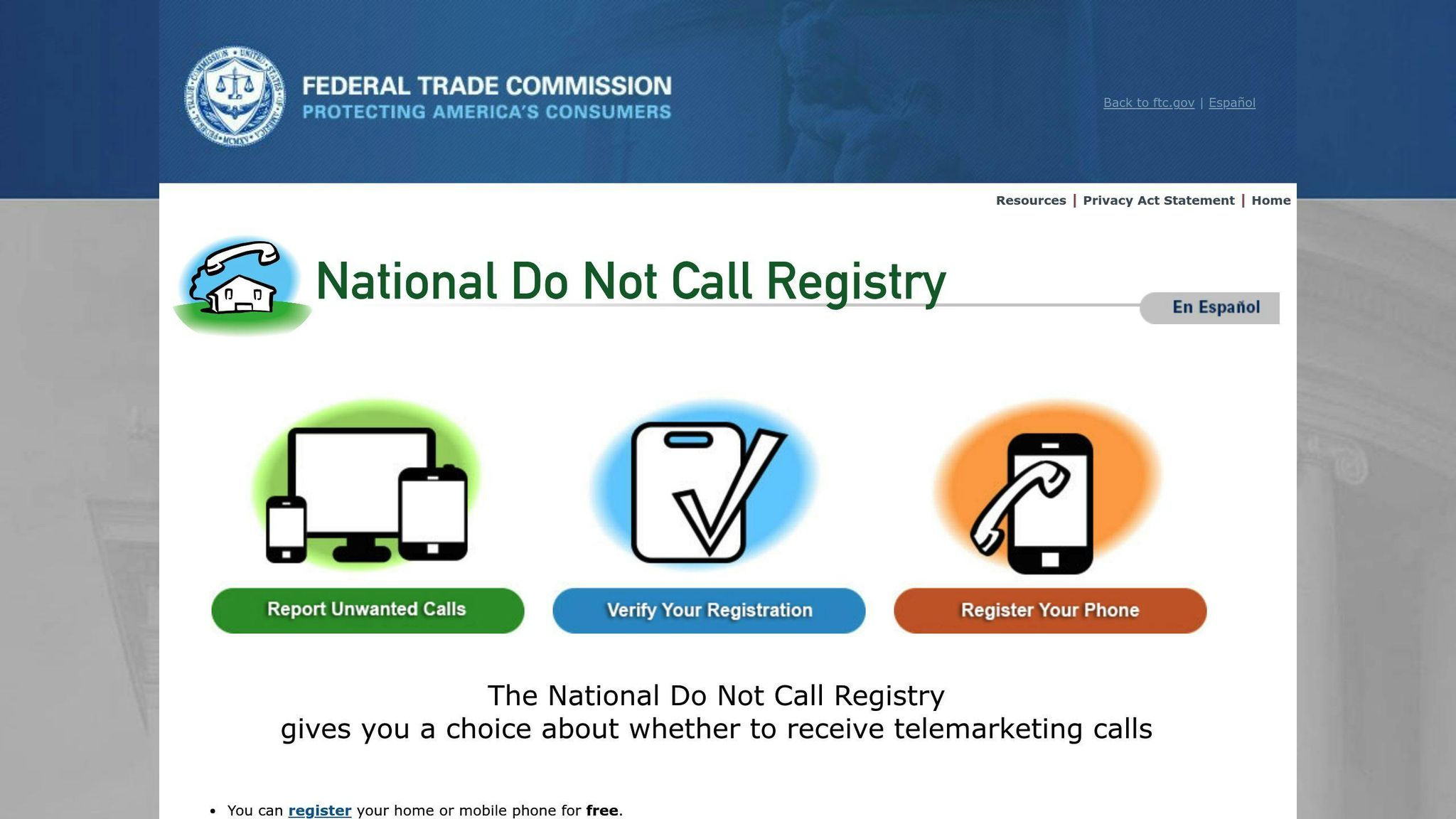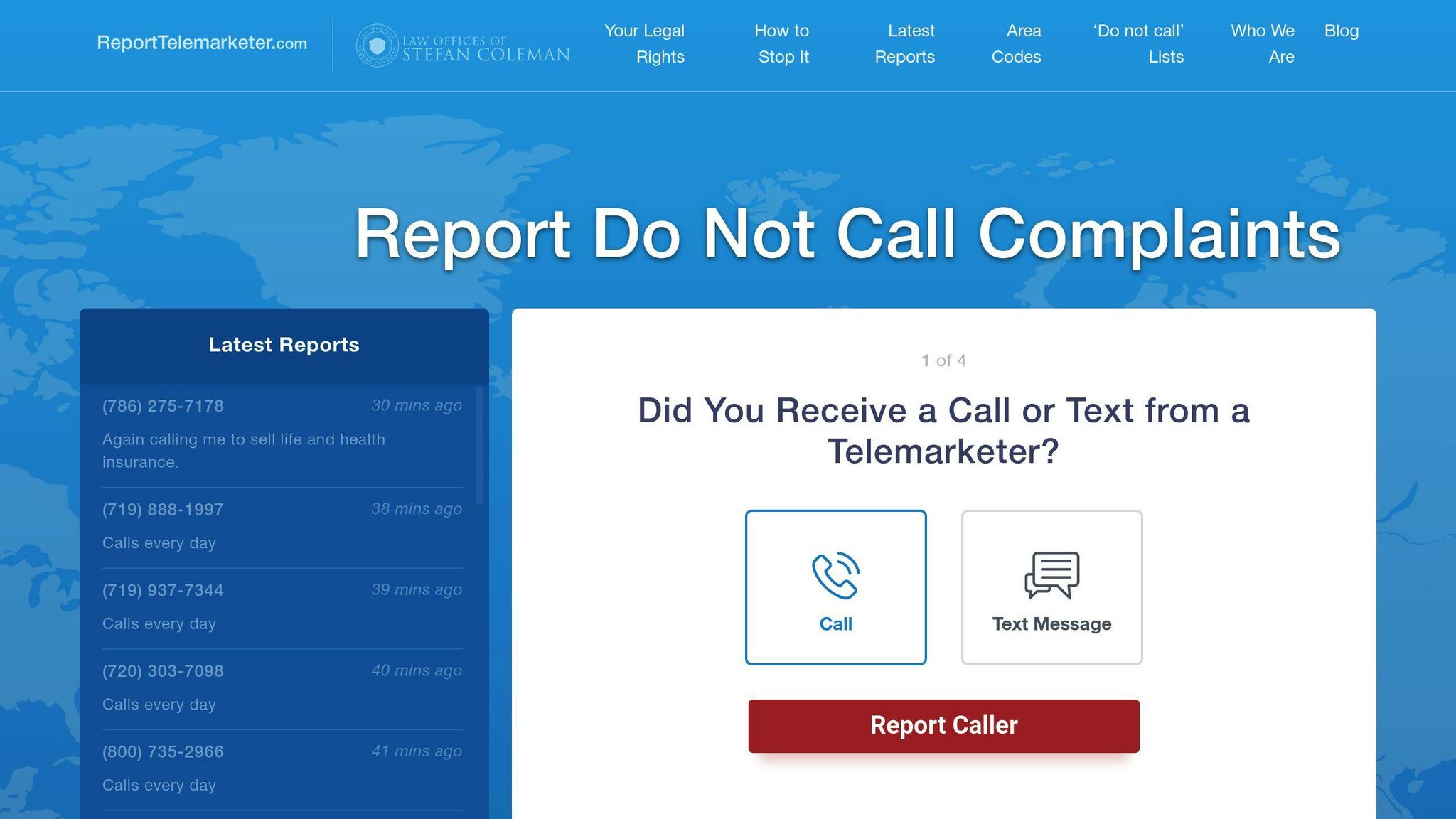
The National Do Not Call Registry saw major shifts in 2024. Key highlights include:
- Sharp Drop in Robocall Complaints: Complaints decreased to 1.1 million in FY 2024, down from 3.4 million in FY 2021.
- Registry Growth: Registrations grew to 254 million, reflecting more consumer action against unwanted calls.
- Top Complaint Categories: Medical scams (170,000), imposter scams (158,000), and debt-reduction scams (117,000) led the list.
- Geographic Hotspots: Delaware, Ohio, and Arizona had the highest complaint rates per capita.
- Debt Reduction Scams Surge: Complaints about these scams rose by 85% compared to 2023.
The FTC continues to combat illegal calls with advanced tools like the Robocall Mitigation Database and new rules targeting AI-driven scams. Consumers are encouraged to register their numbers, report violations, and stay vigilant against top scams.
National Do Not Call Registry Limitations and Enforcement

Highlights from the 2024 Data
Growth in Registry Sign-Ups
By September 2024, active registrations on the National Do Not Call Registry reached 254 million, an increase from 249.5 million in FY 2023. This steady growth shows that more consumers are taking steps to block unwanted telemarketing calls.
Trends in Consumer Complaints
Robocall complaints dropped again in FY 2024, with 1.1 million reports compared to 1.2 million in FY 2023 and 3.4 million in FY 2021. This ongoing decline points to the success of enforcement actions and call-blocking tools in reducing illegal robocalls.
The top complaint categories in 2024 included:
| Complaint Category | Number of Reports |
|---|---|
| Medical Scams | 170,000 |
| Imposter Scams | 158,000 |
| Debt Reduction | 117,000 |
State-by-State Complaint Breakdown
The states with the highest complaint rates per 100,000 residents in FY 2024 were:
- Delaware
- Ohio
- Arizona
- Illinois
- North Carolina
These differences likely reflect varying levels of telemarketing activity and reporting practices. Analyzing these regional patterns helps regulators focus efforts on areas with higher risks and improve enforcement strategies.
The overall drop in complaints, especially robocall-related ones, highlights the impact of consumer protection efforts and advancements in blocking technologies. Geographic data like this plays a key role in refining enforcement tactics and addressing problem areas more efficiently.
sbb-itb-a8d93e1
Efforts to Enforce Telemarketing Laws
Actions Taken by the FTC and FCC
The Federal Trade Commission (FTC) ramped up its enforcement measures in 2024, building on the success of Operation Stop Scam Calls from 2023. This operation marked the largest telemarketing crackdown in the agency’s history. One notable step forward has been the expansion of the Telemarketing Sales Rule (TSR), which now includes protections for businesses against illegal telemarketing practices.
"Illegal calls remain a persistent issue, but the FTC’s strategy to target upstream players and emerging threats is yielding clear results", said Sam Levine, Director of the FTC’s Bureau of Consumer Protection.
New rules specifically targeting scams that impersonate government agencies or businesses aim to tackle some of the most frequent fraudulent calls. To support these efforts, the FTC has also introduced advanced technological solutions to better combat illegal telemarketing.
New Tools to Block Illegal Calls
The FTC has rolled out several technologies designed to curb illegal calls:
- Robocall Mitigation Database: Keeps track of and blocks known robocallers, reducing repeat violations.
- Do-Not-Originate Lists: Prevents spoofing by blocking calls from numbers that shouldn’t originate calls, protecting legitimate ones.
- Voice Cloning Challenge: Addresses the growing threat of AI-generated scam calls.
How ReportTelemarketer.com Helps Consumers

Private platforms like ReportTelemarketer.com serve as an additional layer of protection for consumers. This platform uses specialized tools to investigate telemarketing violations. When violations are confirmed, it takes legal action, such as filing complaints or issuing cease-and-desist letters – all at no cost to users.
Beyond enforcement, ReportTelemarketer.com offers educational resources to help users understand their rights under the National Do Not Call Registry and other regulations. By raising awareness, the platform empowers consumers to recognize and respond to illegal telemarketing practices.
As enforcement strategies and technologies advance, the focus continues to shift toward new solutions and legislative updates to strengthen consumer protections.
What’s Next for Consumer Protection
Possible Changes to Telemarketing Rules
The Federal Trade Commission (FTC) is gearing up to update telemarketing regulations for 2025 and beyond. One of their main priorities is tackling AI-driven scam calls, especially those using voice cloning technology to mimic legitimate businesses or government entities.
"The FTC’s proactive approach to tackling emerging threats like AI-enabled scams is driving measurable progress."
Here’s a glimpse of the planned changes:
| Focus Area | Planned Updates |
|---|---|
| AI Voice Cloning | Improved detection and prevention tools |
| Business Communications | Expanded TSR to cover B2B interactions |
While these updates aim to address new challenges, advancements in technology also play a key role in boosting consumer protection.
Advances in Call-Blocking Technology
Technology is reshaping how telemarketing scams are handled. Building on earlier initiatives like the Voice Cloning Challenge, Voice Pattern Analysis now works in tandem with the Robocall Mitigation Database to better combat sophisticated scams.
Here’s how these tools work together:
- Spotting patterns in call behavior
- Instantly identifying and blocking suspicious calls
- Sharing data across networks to improve detection accuracy
Platforms like ReportTelemarketer.com add another layer of defense by offering tools for investigating and reporting scam calls.
With these advancements and stronger regulations, consumers can look forward to better protection against unwanted telemarketing and scam calls.
Summary and Final Thoughts
Key Insights from the 2024 Data
The 2024 data reveals a sharp drop in complaint volumes, falling to 1.1 million from 3.4 million in 2021, alongside a steady increase in registry sign-ups, now exceeding 253 million active numbers. Medical and imposter scams were the most reported issues, while debt reduction scams experienced an 85% jump compared to 2023.
"Sam Levine emphasized the FTC’s success in targeting upstream players and emerging threats."
Steps Consumers Can Take
Tackling unwanted calls has become more straightforward. Certain states stood out in reporting violations, reflecting regional differences in telemarketing activities. To stay protected, consumers should:
- Register their numbers at donotcall.gov.
- Report violations using platforms like ReportTelemarketer.com.
- Be cautious of medical and debt reduction scams, which remain top complaint categories.
With stronger enforcement measures, smarter technology, and growing consumer awareness, the fight against unwanted calls continues to make progress. Consumer vigilance paired with these efforts will be key to maintaining this momentum.